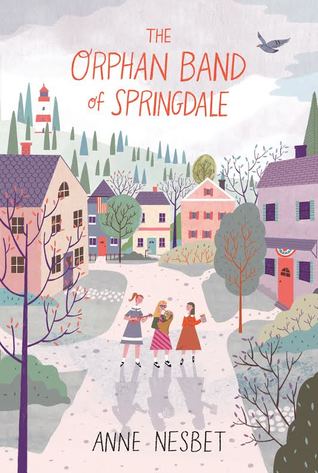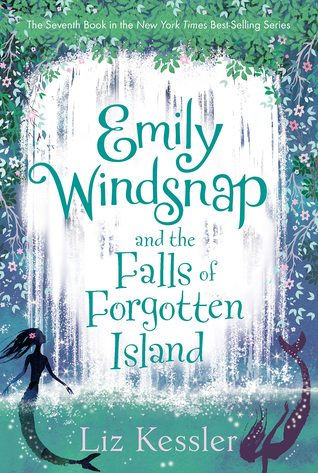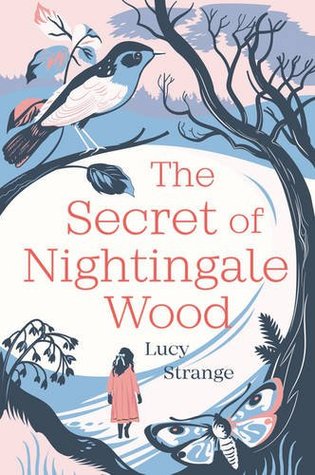 |
| Click to view on Goodreads |
It’s 1941, and tensions are rising in the United States as the Second World War rages in Europe. Eleven-year-old Gusta’s life, like the world around her, is about to change. Her father, a foreign-born labor organizer, has had to flee the country, and Gusta has been sent to live in an orphanage run by her grandmother. Nearsighted, snaggletoothed Gusta arrives in Springdale, Maine, lugging her one precious possession: a beloved old French horn, her sole memento of her father. But in a family that’s long on troubles and short on money, how can a girl hang on to something so valuable and yet so useless when Gusta’s mill-worker uncle needs surgery to fix his mangled hand, with no union to help him pay? Inspired by her mother’s fanciful stories, Gusta secretly hopes to find the coin-like “Wish” that her sea-captain grandfather supposedly left hidden somewhere. Meanwhile, even as Gusta gets to know the rambunctious orphans at the home, she feels like an outsider at her new school — and finds herself facing patriotism turned to prejudice, alien registration drives, and a family secret likely to turn the small town upside down.
(448 pages)
I'll be honest: I didn't really know what I was in for when I picked up The Orphan Band of Springdale, and I kind of thought it was going to be a little bit boring. I like historical fiction, but some areas (such as orphans going to live with a troubled family in a small town) have been done nearly to death by this point.
I'm very happy to report, though, that The Orphan Band of Springdale avoids a lot of the pitfalls of its niche. Some of the plot devices and twists may look familiar, but the book as a whole is done in a fairly original and definitely gripping manner. It handles a lot of messy, complicated issues such as anti-German sentiment in the 1940s, the handling of sensitive family history, and the labor organization movement. All of these are done very well, I thought, and woven together very tightly and interspersed with the right amount of humor to keep things from becoming too dark for its target audience.
I think my favorite thing about this book is that it works very hard to show both sides of every issue and paint the characters as complex and nuanced. There are almost no pure villains or amazing heroes in Springdale; people make their decisions out of love, out of fear, out of necessity; sometimes those decisions are good ones that improve life for everyone involved, and sometimes those decisions are bad ones which wind up hurting people around them. But they always have reasons for the choices they make, and sometimes those reasons are actually very reasonable (even if we may not like their results). For example, it's not really fair that Gusta–an innocent child–gets bullied because of her German last name, but it is true that her father is literally from Germany and WWII has already started; fears that her family might be connected to the Nazis aren't entirely unreasonable. As the granddaughter of a Swiss-German American who lost the German language which had been handed down for generations, because schoolteachers and parents decided it wasn't a good idea to let their kids speak German in the 1940s, I can mourn for the loss of cultural heritage people of German ancestry experienced during WWII–and the discrimination some, like Gusta, experienced–but I also understand that it was necessary to a certain extent. I think Nesbet does a good job walking the line between the two perspectives, showing us the atmosphere of the time and its results.
The Orphan Band of Springdale is a good book, a nuanced book, and I really enjoyed reading it. It may be a bit long for some younger readers, but if they can make it through the 450 pages then I recommend it. Let me know in the comments below if you or anyone you know has read it, and give us your thoughts!
Disclaimer: I received a complimentary copy of this novel from the publisher in exchange for an honest review.
I'll be honest: I didn't really know what I was in for when I picked up The Orphan Band of Springdale, and I kind of thought it was going to be a little bit boring. I like historical fiction, but some areas (such as orphans going to live with a troubled family in a small town) have been done nearly to death by this point.
I'm very happy to report, though, that The Orphan Band of Springdale avoids a lot of the pitfalls of its niche. Some of the plot devices and twists may look familiar, but the book as a whole is done in a fairly original and definitely gripping manner. It handles a lot of messy, complicated issues such as anti-German sentiment in the 1940s, the handling of sensitive family history, and the labor organization movement. All of these are done very well, I thought, and woven together very tightly and interspersed with the right amount of humor to keep things from becoming too dark for its target audience.
I think my favorite thing about this book is that it works very hard to show both sides of every issue and paint the characters as complex and nuanced. There are almost no pure villains or amazing heroes in Springdale; people make their decisions out of love, out of fear, out of necessity; sometimes those decisions are good ones that improve life for everyone involved, and sometimes those decisions are bad ones which wind up hurting people around them. But they always have reasons for the choices they make, and sometimes those reasons are actually very reasonable (even if we may not like their results). For example, it's not really fair that Gusta–an innocent child–gets bullied because of her German last name, but it is true that her father is literally from Germany and WWII has already started; fears that her family might be connected to the Nazis aren't entirely unreasonable. As the granddaughter of a Swiss-German American who lost the German language which had been handed down for generations, because schoolteachers and parents decided it wasn't a good idea to let their kids speak German in the 1940s, I can mourn for the loss of cultural heritage people of German ancestry experienced during WWII–and the discrimination some, like Gusta, experienced–but I also understand that it was necessary to a certain extent. I think Nesbet does a good job walking the line between the two perspectives, showing us the atmosphere of the time and its results.
The Orphan Band of Springdale is a good book, a nuanced book, and I really enjoyed reading it. It may be a bit long for some younger readers, but if they can make it through the 450 pages then I recommend it. Let me know in the comments below if you or anyone you know has read it, and give us your thoughts!
Disclaimer: I received a complimentary copy of this novel from the publisher in exchange for an honest review.



